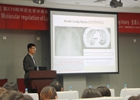Time:2016-10-19 Browse times:51
On October 18, Postgraduate Academic Weekend Lectures,organized by the Graduate Student Affairs Department of the Party Committee of Nankai University and held by the College of Life Sciences, was held in the lecture hall of the new biological station. At the invitation of Professor Ning of the College of Life Sciences, Dr. Zhao from the University of Pittsburgh School of Medicine gave a lecture entitled "Molecular Regulation of Lysophosphatidic Acid Receptor 1 Stability in Acute Lung Injury", which attracted a large number of teachers and students to attend. Dr. Zhao is an Associate Professor of Department of Medicine of University of Pittsburgh ,a Co-director of the Acute Lung Injury Center of the University of Pittsburgh, a president of the American and Chinese Lung Association, engaged in acute tissue injury induced systemic inflammatory response syndrome, abdominal sepsis and lung injury Related research.
Firstly, Dr. Zhao introduced the pathogenesis of acute lung injury and its characteristics of high morbidity and mortality, and then focused on explaining the role of lysophosphatidic acid receptor 1 (LPA1) signal in the acute lung injury and the molecular regulation of LPA1 stability mechanism. Dr. Zhao with his team found that LPA1 knockout mice, induced by bleomycin-induced pulmonary fibrosis and LPS-induced inflammatory response , was significantly reduced. Furthermore, they found that Nedd4L, Peptide, USP11 and other related factors can regulate the ubiquitination and deubiquitination of LPA1, and then affect the role of LPA1 signal in the regulation of LPA1 signaling molecules. Dr. Zhao's speech provided a more detailed understanding of the molecular mechanisms of acute lung injury and its associated LAP1 signaling.
After the report, the students actively participated in the discussion, and raised relevant questions, Dr. Zhao patiently answered. The atmosphere of the lecture was lively, and finally ended in applause.
